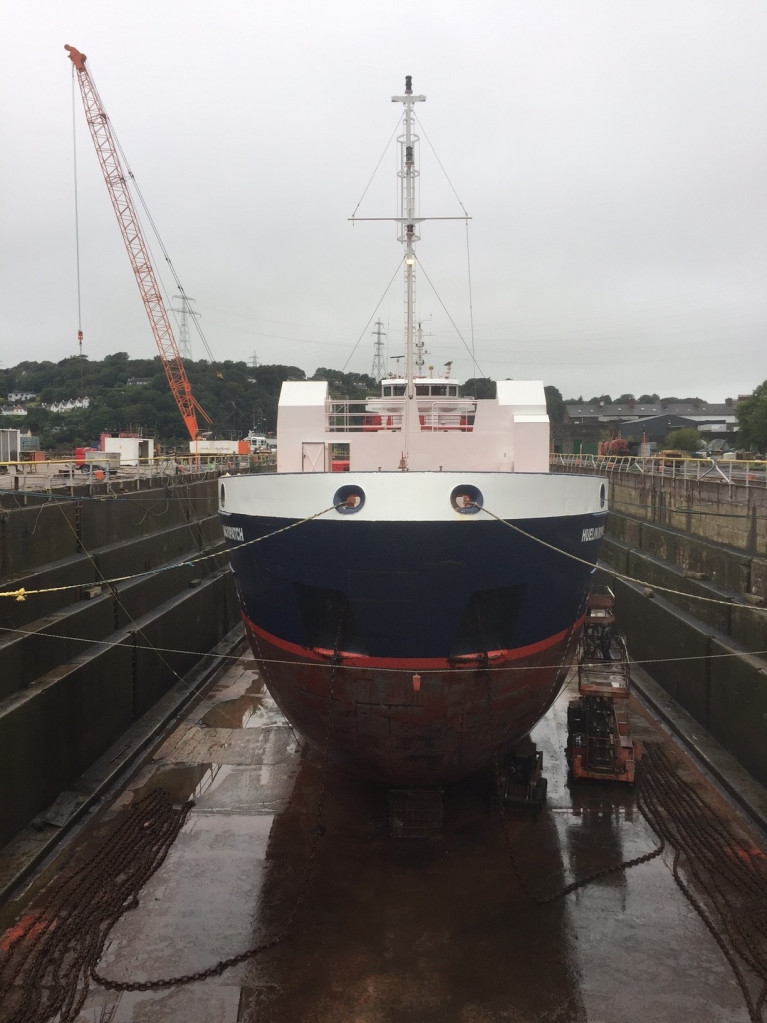Displaying items by tag: Sole (Cork) Dockyard
Irish Flagged Cargoship Departs Ireland's Sole 'Ship' Dockyard With A Charter to Where Next?
It is pleasing for Afloat to track an Irish flagged cargoship that appropriately used an Irish Dockyard, albeit sadly at the only dry-dock facility available for 'ships' in the State, writes Jehan Ashmore.
The shipyard is Cork Dockyard, as distinct to boatyards scattered around our coast which concentrate primarily with the fishing fleet, though larger trawlers from Killybegs have used the facility in Cork Harbour. It is here that the shiprepair and maintenance facility part of the Doyle Shipping Group (DSG) easily accommodated the 89m cargoship MV Huelin Dispatch into the 165m graving dock.
Afloat contacted Dundalk Shipping which cited the reason for the call of Huelin Dispatch was merely for a routine intermediate docking. Also according to the Co. Louth based operator, nothing major was found and that the vessel refloated is now ready for business and is awaiting orders from a charterer.
As for the dominance of the Arklow Shipping's fleet of around 40 Irish flagged cargoships (plus 16 on the Dutch registry) when compared to the Dundalk shipowner which is a rare breed in the Irish merchant shipping scene given its trades with a single-ship. Huelin Dispatch is a cargoship that can transport containers as well as hazardous shipments. In addition to trading bulk, steel coils, steel, forest products, grain and general cargo etc.
For almost a fortnight the 2,597 gross tonnage Huelin Dispatch was at the marine engineering facility located in Rushbrooke nearby of Cobh. Following yesterday's afternoon departure, the cargoship remains this evening is at anchor offshore west of Cork Harbour, the main anchorage zone for ships using the Port of Cork.
Meanwhile the local ferry Spike Island is outside of the Munster graving dock which in 1995 DSG acquired and as alluded is the sole surviving ship dry-dock in the State. This following the closure of Dublin Graving Docks in 2016 with the last merchant ship Arklow Fame (subsequently reopened 'temporarily' especially for tallship Jeanie Johnston in 2017). The larger 220m dry-dock in the Irish capital is where Huelin Dispatch was too a customer though the former site is part of Dublin Port's ongoing Alexandra Basin Redevolopment (ABR) project. This is to increase quay space and cargo hard standing for increasingly larger vessels.
Another customer albeit at the remaining southern dry-dock as Afloat recently reported was the Northern Ireland fishery and research vessel RV Corystes which had sailed south from Ulster in late April. The 1,280 gross tonnage UK Red Ensign flagged vessel departed the dry-dock on 12th May to return to the Belfast based owner the Agri-Food and Biosciences Institute (AFBI) which among the clients of the 53m vessel is the Northern Ireland government.
On the next day Huelin Dispatch entered Cork Dockyard, ironically a previous Dutch owner of the facility was the Damen Group. They built in 2012 for the Irish owner at a cost of £8.8m, to the shipyard's own design the Combi-Freighter 3850 at Bergum in the Netherlands.
Also in that year the 3,800dwt newbuild Huelin Dispatch was delivered in September, with the Dundalk registered vessel (see photo) firstly entering service by trading on the English Channel between the UK and Channel Islands with a charter to Huelin-Renouf. The Damen standard ship was built with modifications specified by Dundalk Shipping, this involved the accommodation for up to 8 crew (in particular the Captain's quarters) in addition the fitting of tween decks to suit trading to the Channel Islands.
Initially, the freight service included calls to Braye Harbour on Alderney, the most outlying of these islands but situated the nearest to France. The relationship with the Channel Islands based firm was all too brief as the firm went into liquidation in 2013, however the legacy remains from this stint during the ship's early career as the name of the cargoship is retained.
The short-sea trader however continued its freight run as Channel Island Lines (CIL) stepped in on the link from the UK mainland. Likewise of Huelin-Renouf they based the Irish ship out of Southampton to connect services to the main Channel Islands of Guernsey and Jersey.
CIL's charter however in more recent times ceased. In the interim period until the current return to Irish waters, Afloat has on occasions tracked Huelin Dispatch to Scandinavia. So where next? for this small cargoship yet proudly Irish-owned, registered and sailing under the tricolor.
























































